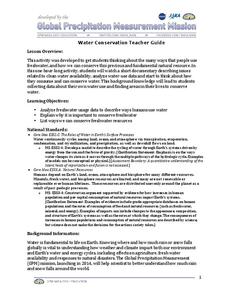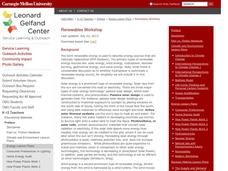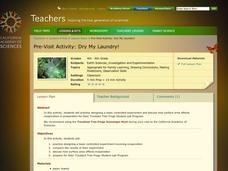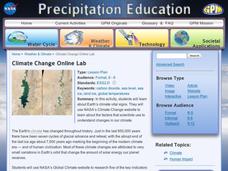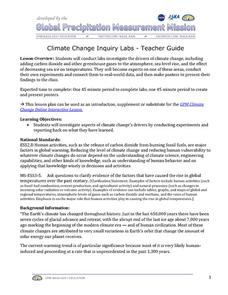Curated OER
Water Conservation
Open learners' eyes to the challenge of finding safe drinking water – something we often take for granted in our country. The PowerPoint presentation includes images, graphs, diagrams, and even a video to stimulate discussion on how we...
The Science Spot
Independent Investigation Guidelines
A neatly formatted outline of the steps of the scientific method can be used as a reference sheet for your future science fair participants. For each step, you will find a few guiding questions or points to remember when working on them.
Carnegie Mellon University
Introduction to Climate
Begin a full lesson on climate change by demonstrating how carbon dioxide gas contributes to increased temperatures. Be aware that pressure inside the antacid-containing bottle in Activity 2 may cause the lid to fly off; keep viewers at...
Carnegie Mellon University
Ocean Acidification
After brainstorming what they know about ocean acidification, youngsters place eggs in acid to determine the effects on calcium-containing organisms, and add carbon dioxide to solutions with sea shell material to discover the impact on pH.
Carnegie Mellon University
Transportation
Teach your environmental studies, life science, or engineering class how an internal combustion engine works using the first few slides of the accompanying presentation. Then, focus in on the resulting carbon emissions. Finally, take a...
Carnegie Mellon University
Renewables Workshop
Youngsters examine resource maps to find out which states are using solar and wind power and discuss as a class various other renewable energy sources. They use a provided data table to record pros and cons to each technology, build and...
California Academy of Science
Dry My Laundry!
Meant to be a pre-field trip lesson, this can also serve as a cute and simple activity to use when your little ones are learning about evaporation or surface area. The children cut tiny t-shirts out of paper towel material, wet them, and...
Howard Hughes Medical Institute
The Day the Mesozoic Died
While this is not the traditional, step-by-step lesson plan, it is chock-full of material that you can easily incorporate into your earth history unit. Its main purpose is to serve as a guide to using a three-part film, The Day the...
California Academy of Science
Earthquakes and Tectonic Plates
Here is a comprehensive package in which middle schoolers learn about types of seismic waves, triangulation, and tectonic plate boundaries. Complete vocabulary, colorful maps, and a worksheet are included via links on the webpage. You...
Curated OER
Earth's Water
If the majority of our planet is covered with water, why do we need to bother conserving it? With a thorough and varied investigation into the location and types of water on the earth, learners will gain an understanding of why this...
NASA
Climate Change Online Lab
What are the key indicators that show scientists that our planet is in the fastest warming trend ever? Learners go on a WebQuest to examine the evidence for themselves. Following several links to NASA sites, kids see how the global...
Curated OER
Connect the Spheres: Earth Systems Interactions
Is everything really connected? Take your class on a walk outside, where they will make observations and write them down on a worksheet. Once they are back in the classroom, learners will work to determine if and how things like birds,...
NASA
Climate Change Inquiry Lab
With global temperatures on the rise faster than ever recorded, the effects of a heating planet could be devastating. Allow learners to discover just what the world is in store for if the warming continues through a series of videos, a...
Scholastic
Study Jams! The Rock Cycle
Rock out with a song, video, and quiz about the rock cycle. Learn how it is similar to recycling, the different kinds of rocks, and how they form. There is a karaoke feature that allows learners to sing along, helping to cement the...
NASA
Geographical Influences
"If global warming is real, why is it so cold?" Distinguishing the difference between weather and climate is important when it comes to understanding our planet. In these activities, young scientists look at the climate patterns in a...
Curated OER
Exploring the Water Cycle
The water cycle is one of earth's most easily observable processes, but demonstrating each step within classroom walls can be a challenge. Through a series of videos and quick demonstrations, cover each aspect of the hydrologic cycle in...
Scholastic
Study Jams! Earth's Atmosphere
Earth's thick atmosphere plays a vital role in the ability of the planet to sustain life. Learn about the layers of the atmosphere and their properties, how the gases surrounding the earth help protect the planet, and a little about...
Scholastic
Study Jams! Seasons
Use this during the season of teaching about the seasons! As Earth revolves around the sun, its tilt causes the weather to change. The graphics in this presentation show how Earth's position in space has an effect on the angle of...
Scholastic
Study Jams! Air Masses & Fronts
Four types of air masses interact in the atmosphere above the US. The collision of these air masses forms a front, which, in turn, creates our weather. Concepts are explained by Sam and RJ, thus preventing a snowball fight. Your class...
Scholastic
Study Jams! Waves & Currents
Ocean lovers hang ten as they watch this film about waves and currents. What causes waves? What is a current? Learn this and more from Sam as he explains why RJ was struggling to surf the gnarly waves. Have your class watch this at home...
Scholastic
Study Jams! The Ocean Floor
Under the sea, the geography is as varied as it is on land! Young oceanographers find out about continental shelves, abyssal plains, seamounts, trenches, and mid-ocean ridges by viewing and reading the eight high-quality slides. Then...
Scholastic
Study Jams! The Water Cycle
Will tomorrow's soccer game be rained out? That depends on the water cycle. An animated feature explains precipitation, evaporation, transpiration, and condensation with diagrams and dialogue between Sam and RJ as they huddle under a...
Scholastic
Study Jams! Earthquakes
Have a seismic moment with your class as you show this animated video on earthquakes. Viewers find that quakes occur on faults and are caused by shifting of continental plates. They learn what properties are studied by seismologists and...
Scholastic
Study Jams! Weathering & Erosion
RJ argues that playing the video game, Super Duo Breaker and Whoosh, is a good way to study for a quiz on weathering and erosion. The game character Mr. Breaker breaks things down and the character Mr. Whoosh carries them away in the...


